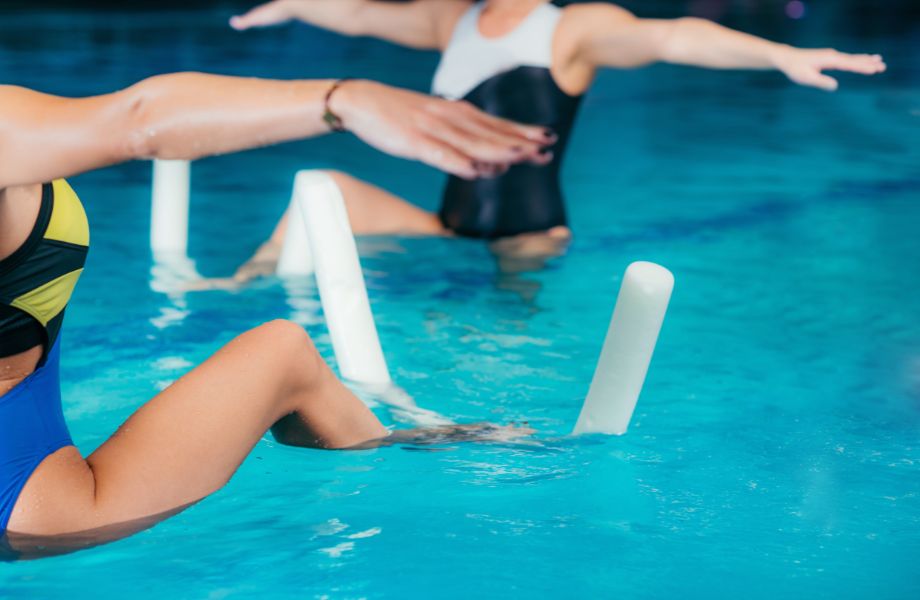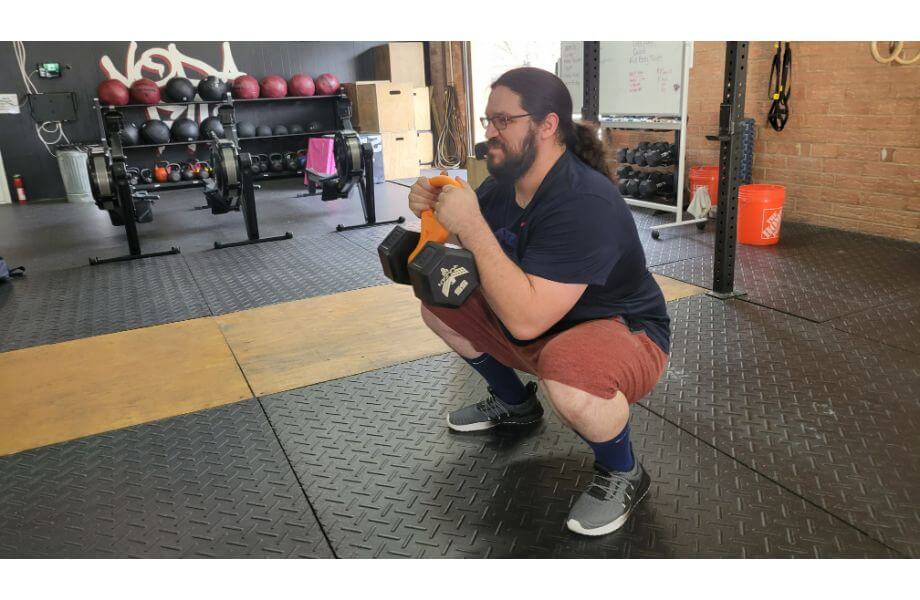The benefits of water aerobics don’t just apply to older adults, folks with chronic pain, and people recovering from an injury. Water aerobics is a form of exercise with a two-sided health benefit: It’s considered both cardiovascular and resistance training.
As a certified personal trainer, I know most people have access to train on some of the best home gym equipment versus hopping in a pool for water aerobics. But if you have a health club near you with water aerobics classes, this might be your new favorite training method.
Medical disclaimer: This article is intended for educational and informational purposes only. It is not intended as a substitute for medical advice. For health advice, contact a licensed healthcare professional or physical therapist.
What Is Water Aerobics?
Water aerobics is a low-impact water workout typically done in a swimming pool. Health clubs with pools may also refer to water aerobic sessions as aqua fitness or aqua aerobics.
You may know from personal experience when walking into any body of water, you instantly feel drag as you move forward. Even walking through knee-deep water creates more drag than walking on dry land.
In addition to the resistance, water-based exercise feels different than land-based exercise because of the buoyancy of water. For this reason, in-water exercise offers a unique experience of natural resistance in a low-impact (nearly weightless) environment.
RELATED: What Is Resistance Training?
Top Benefits of Water Aerobics
Below, I’ll highlight the top benefits of water aerobics you can look forward to at your next water aerobics class. You can expect the following benefits:
- Low-impact to joints
- Can improve heart health
- Develops muscle strength
- May improve coordination
- May aid with weight loss
- Can boost mood
Water Aerobics Is Low-Impact
While many folks associate beaches and swimming pools with a fun way to spend summer days, water offers a natural environment for working out. And it’s not just for swimmers.
RELATED: Triathlon Training
Water makes our bodies buoyant, which reduces impact and stress on joints. While this may not matter to folks looking for ways to increase bone density through spinal loading, for folks with joint pain, getting in the water may make movement feel better.
RELATED: Benefits of Strength Training
A recent systematic review1 found that water exercise is a low-impact activity that can reduce joint pain and dysfunction while increasing range of motion and quality of life for folks with osteoarthritis, a degenerative joint disease. While this study was done on patients with osteoarthritis, other groups with joint pain can benefit from water aerobics including larger individuals, older adults, and folks recovering from injury or surgery.
RELATED: Best Low-Impact Cardio

Water Aerobics May Help Improve Heart Health
Much like the muscles that make up your body, the heart is made up of muscles. This means that your cardiovascular health hinges on your frequency and ability to do cardio exercise. Cardio stimulates your heart to work and get stronger just like your lower body on leg day.
Water aerobics can stimulate your heart rate to increase, similar to other forms of cardio exercise like running, cycling, or rowing. A recent study published by the Journal of Cardiovascular Development and Disease2 found that two weeks of an aquatic exercise program helped improve heart rate variability in folks with coronary artery disease.
Additionally, blood pressure—a measurement that is related to your overall heart health—can also improve from water aerobics. A 2020 study3 found that older women with high blood pressure were able to improve blood pressure readings more drastically with water aerobics than study participants who participated in land-based exercise.
RELATED: Cardiovascular Fitness
Water Aerobics Can Build Strength
Because water creates drag and natural resistance, it’s possible to develop muscle and build strength with water aerobics. While water may not offer standard strength training resistance from dumbbells and barbells, a 2009 study4 on healthy young men found that during a three-month water-based exercise program participants increased muscle strength, power, and muscle size. However, it’s worth noting that the most significant changes were seen in upper-body muscle groups for both strength and size.
RELATED: Best Supplements for Muscle Growth
Water Aerobics May Help With Coordination
Water aerobics fitness classes are popular among older adults for good reason. Older adults can utilize a low-impact environment to practice walking, jumping, and rebounding on one (and two) legs, which can help reduce the risk of injury from falls and help them recover from potential falls.
The Journal of Physical Therapy Science5 found that during a small study of 15 participants, physical activity in water improved gait pattern and balance in older adult participants when tested for fall recovery while walking on an incline ramp with a randomized trap door (yikes!).
RELATED: Best Treadmills for Seniors

Water Aerobics May Aid With Weight Loss
An additional benefit to water aerobics is the potential to reduce body weight. That said, a Public Library of Science6 paper published in 2018 compared two studies on body composition changes from water aerobics. The first study found that short-term water aerobics programs did not produce significant weight loss changes in elderly women or obese individuals.
However, the second study compared in the paper notes that longer, months-long water-based exercise programs did indeed show reduction in weight loss and hip and waist circumference measurements in older women.
RELATED: Best Weight Loss Programs

May Help Improve Mood
And last but not least, water aerobics exercise classes may elicit the same mood-boosting effects of endurance training and strength training. A 2022 systematic review published by Frontiers in Psychiatry7 took a deep-dive into 18 different studies focused on the benefits of in-water exercise. After reviewing the results of more than 400 people, it was found that water-based exercise may have a better effect on mood and anxiety symptoms than on chronic depression.
RELATED: Exercise and Mental Health
Benefits of Water Aerobics: Final Thoughts
Water aerobics is a legitimate form of exercise that can stimulate your heart rate and muscle growth. It’s also low-impact which is favorable for a variety of populations including larger folks, older adults, people who experience joint pain, and anyone recovering from an injury or surgery.
Consider water aerobics if you:
- Have joint pain
- Need low-impact exercise
- Want to build muscle and potentially lose weight
- Need a safe environment to practice balance and coordination
- Want to reduce symptoms of anxiety
Benefits of Water Aerobics: FAQs
How many times a week should you do water aerobics?
Because water aerobics is a low-impact form of exercise, you don’t need to worry about overuse on your joints. However, most of the studies we used to back up the benefits of water aerobics had participants doing water aerobics sessions two to three times per week.
Is water aerobics good for weight loss?
Water aerobics may impact weight loss, but one review6 compared two studies: A short-term and long-term water aerobics program. No significant body composition changes occurred in the short-term program, however greater results came from the 8-month-long water aerobic plan.
Can water aerobics tone your body?
The natural resistance from water can create drag while doing water aerobic classes and exercise. A 2009 study4 performed on young, healthy men found that during a 3-month-long water aerobics program participants were stronger, had more power, and increased muscle size.
References
- Song, J. A., & Oh, J. W. (2022). Effects of Aquatic Exercises for Patients with Osteoarthritis: Systematic Review with Meta-Analysis. Healthcare (Basel, Switzerland), 10(3), 560. https://doi.org/10.3390/healthcare10030560
- Jug, B., Vasić, D., Novaković, M., Avbelj, V., Rupert, L., & Kšela, J. (2022). The Effect of Aquatic Exercise Training on Heart Rate Variability in Patients with Coronary Artery Disease. Journal of cardiovascular development and disease, 9(8), 251. https://doi.org/10.3390/jcdd9080251
- Júnior, F. A., Gomes, S. G., da Silva, F. F., Souza, P. M., Oliveira, E. C., Coelho, D. B., Nascimento-Neto, R. M., Lima, W., & Becker, L. K. (2020). The effects of aquatic and land exercise on resting blood pressure and post-exercise hypotension response in elderly hypertensives. Cardiovascular journal of Africa, 31(3), 116–122. https://doi.org/10.5830/CVJA-2019-051
- Colado, J. C., Tella, V., Triplett, N. T., & González, L. M. (2009). Effects of a short-term aquatic resistance program on strength and body composition in fit young men. Journal of strength and conditioning research, 23(2), 549–559. https://doi.org/10.1519/JSC.0b013e31818eff5d
- Kim, S. B., & O’sullivan, D. M. (2013). Effects of Aqua Aerobic Therapy Exercise for Older Adults on Muscular Strength, Agility and Balance to Prevent Falling during Gait. Journal of physical therapy science, 25(8), 923–927. https://doi.org/10.1589/jpts.25.923
- Pereira Neiva, H., Brandão Faíl, L., Izquierdo, M., Marques, M. C., & Marinho, D. A. (2018). The effect of 12 weeks of water-aerobics on health status and physical fitness: An ecological approach. PloS one, 13(5), e0198319. https://doi.org/10.1371/journal.pone.0198319
- Tang, Z., Wang, Y., Liu, J., & Liu, Y. (2022). Effects of aquatic exercise on mood and anxiety symptoms: A systematic review and meta-analysis. Frontiers in psychiatry, 13, 1051551. https://doi.org/10.3389/fpsyt.2022.1051551







